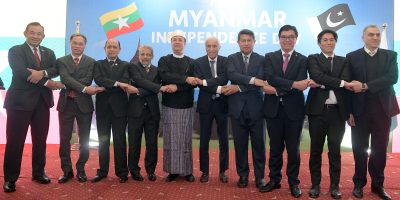IPRI organized One-Day Conference on ‘Issues of Radicalisation and Extreme Behaviour in Pakistan’

ISLAMABAD, JAN 30 (DNA) – National Counter Terrorism Authority (NACTA) has finalised a robust National Narrative on extremism, sectarianism, terrorism and militancy. This narrative once approved by the Government of Pakistan will be the cornerstone of the country’s response to non-traditional threats and to deal with extremist ideology.
This was shared by Mr Ihsan Ghani, National Coordinator, National Counter Terrorism Authority (NACTA), here in Islamabad today at the One Day Conference ‘Issues of Radicalisation and Extreme Behaviour in Pakistan’ organised by the Islamabad Policy Research Institute.
He discussed that the draft was developed in consultation with academia, Ulemas and media after 18-month long strenuous efforts. ‘The National Narrative depicts the consensus and resolve of our nation for its future progression and describes Pakistan’s true values,’ he said.
The National Narrative themes include encountering the mis-constructed religious beliefs and creating interfaith harmony and tolerance; implementation of law and establishing the writ of the state; trust development amongst state institutions; strengthening socio-cultural values and customs; working with media; reviewing economic policies and national development; reconciliation and rehabilitation of extremists.
Mr Ghani also shared that the National Counter Extremism Guidelines had also been finalised and were awaiting approval of the Government.
The Guidelines cover areas like service delivery, people’s engagement, education reforms, enabling environment, rehabilitation, reintegration and renunciation and also the promotion of culture. He has apprised that the Guidelines were not formed in a vacuum rather a multidisciplinary policy making model was followed. Both documents have been prepared along with strategies, action plan, activities, budget and operational liabilities.
Discussing the various initiatives, he informed that NACTA is working on the development of Terrorist Profiling under a well thought-out strategy.
‘As a part of its ongoing Tat’heer Drive, NACTA has initiated an App available on Google and Apple to enable citizens to anonymously report extremist content, hate speech, banners, activities wherever they notice them in their areas and also on the Internet.
Surfsafe Online Portal has already been inaugurated to enable citizens to report extremist online- content freely, securely and anonymously and be part of this national cause curbing terrorism and extremism sprawling through Internet’, he informed.
Discussing ‘Radicalisation and Extreme Behaviours in Pakistan: Leading Causes’, Dr Khurram Iqbal, Assistant Professor from the National Defence University, stressed that single factor theories fall short of explaining the cases of terrorism in Pakistan.
‘We need to recognise that radicalisation is caused by multiple factors like vengeance, poverty and religious fundamentalism playing varying roles at the individual, organisational and environmental levels.’ He pointed out that the Western definitions of radicalisation are narrow and do not fit Pakistan since they consciously ignore the geo-strategic aspects and overemphasize on so-called ‘Islamic Terrorism’.
The spillover effects of the war in Afghanistan gave birth to a new breed of terrorist groups in the tribal areas of Pakistan. Inspired by al-Qaeda’s ideology,
Tehrik-e- Taliban Pakistan (TTP) is at the pinnacle of this list, he explained. Dr Iqbal went on to say that the militant landscape of Pakistan cannot be pigeon-holed since it is very diverse and includes religious nationalist groups like Lashkar-e- Tayyeba, Jaish-e- Muhammad, Harkat-ul- Jihad-e- Islami and Al-Badar; as well as sectarian groups like Lashkar-e- Jhangvi, Sipah-e- Muhammad, Jundullah, Zaynaboon, and Ansar-ul- Islam; as well as ethno-nationalist groups.
He concluded that since radicalisation in Pakistan is caused by both external and internal issues, it is important to enhance focus on soft approaches; reduce collateral damage in counterterrorism operations; find a regional solution to Afghanistan; and devise a joint Sino-Pak stance on issues related to the use of proxy groups by India and extra-regional forces.
Lt Gen (R) Masood Aslam, HI, HI(M), SJ in his discussion on ‘Pakistan’s Counter Radicalisation Strategy: Lessons Learnt and Way Forward’ said that the government should not only eliminate the physical militant infrastructure, recruitment bases and recruiters who support radical elements and militant violence, it should also support more vociferously mainstreaming some of the radical elements.
He said that ‘this is no doubt risky, but a concerted and coherent policy with clearly defined lines must be put in place to mainstream the amenable as kinetic efforts alone cannot eliminate terrorism or extremism.’
He agreed that there should be thorough profiling of the life trajectories and backgrounds of those involved in militancy. Discussing deradicalisation efforts in Swat, he said that Swat differs from other parts of the country, therefore, the model adopted there cannot be replicated in FATA or other parts of the country, which have different characteristics and cultural outlook.
Likewise, adopting and replicating models from other countries such as Sri Lanka, Turkey or the UK will not be fruitful, in the absence of linkages.
‘There should be a strategy of taking advantage of the repatriated individuals from the pilot programmes who can act as messengers of deradicalisation in their local communities,’ he recommended. Lt Gen Aslam stressed that politico-social initiatives will not bear any fruit if there is no political ownership and political will along with public support to move them towards implementation.
The only way forward to a deradicalised society is improving governance, providing security, job opportunities and justice to the people, he concluded.
In the Q/A session, the panellists answered various questions and pointed out that implementation of NACTA’s draft policies and guidelines hinge on an integrated implementation approach wherein all departments of provincial governments coalesce their efforts towards projects aimed at diminishing extremist tendencies. The delegates concluded that there needs to be a strong bond between the Pakistani state and its citizenry, empowerment, and the inclusion of youth and marginalised elements, reforming educational streams including both religious and contemporary education and instilling an environment of openness and coexistence. There was agreement that given serious worries about radicalism among Pakistan’s educated youth’s preferences, views, and actions, it is important to trace the effects of its various drivers. Participants from various universities discussed that it is not just lagging human development that can explain the state of radicalism among youth. The role of the state and its haphazard education policies have also created a politico-ideological environment that has impacted the outlook of the younger generation in problematic ways. There was unanimous consensus that to address the polarising potential of the education system, the state and civil society should prioritise initiatives that allow regular interaction and dialogue among students from various education tracks; and that since after two decades of battling the menace of sectarianism and religious-based violence, Pakistan is trying to bring all provinces on board to develop a national counter-extremism narrative, it should be supported by all stakeholders.
Related News

Independence Day of Myanmar celebrated in style
In his statement, Ambassador Wuuna Han reflected on Myanmar’s rich cultural heritage, from the goldenRead More

Indian govt continues persecution of Sikhs
Ramesh Singh Arora, Minister for Human Rights and Minorities of Punjab Province, delivered a strongRead More


Comments are Closed